by Lisa Cooke | Nov 13, 2018 | 01 What's New, Genealogy Gems Podcast |
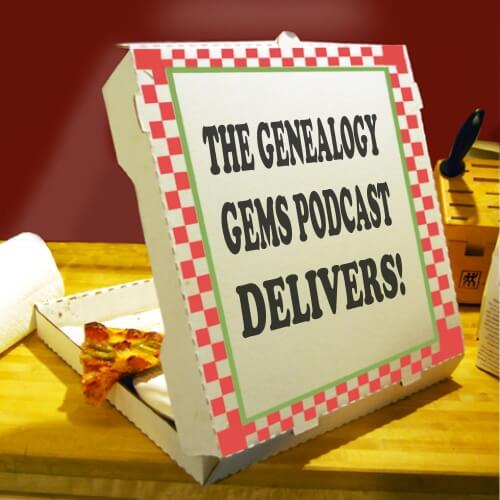
Pandora is now poised for podcast delivery!
Podcasts have always faced an obstacle: it just hasn’t been that easy to find them or listen.
After I launched The Genealogy Gems Podcast in early 2007, I spent most of my time trying to explain to potential listeners how to “subscribe” to the show. Along came the smartphone, and eventually podcast apps, and things got a little easier. In 2010 we launched our own Genealogy Gems Podcast app in hopes of improving the listener experience even more. That’s great for those tenacious enough to find us in the first place, but what about everybody else? Also though podcasts have experienced a huge surge in popularity thanks to the viral Serial podcast, 83% of Americans still aren’t listening on a weekly basis.
Pandora, the largest streaming music provider entered the game today and plans to change all that. And thanks to you, our loyal listeners, The Genealogy Gems Podcast has been selected by Pandora as part of their initial offering of podcasts!
Read below how this music giant is going to tap technology and human curation to recommend podcasts to those who are sure to love them. I’m sure that once Americans discover through Pandora that their family history is just waiting to be discovered, and that The Genealogy Gems Podcast is here to help them do just that, we’ll be welcoming many new listeners. Keep reading for all the details from Pandora. And, be sure to sign up for the early access offering here. You can expect to start seeing our show on Pandora sometime in December.
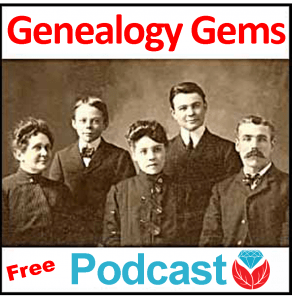
Thanks for listening friend!
Lisa Louise Cooke
PRESS RELEASE
OAKLAND, Calif.–(BUSINESS WIRE)–Pandora (NYSE:P), the largest streaming music provider in the U.S., today unveiled its podcast offering, powered by the Podcast Genome Project, a cataloging system and discovery algorithm that uses a combination of technology and human curation to deliver personalized content recommendations. Beginning today, Pandora will roll out beta access to select listeners on mobile devices. Those interested in early access to the offering can sign-up here, with general availability in the coming weeks.
“It might feel like podcasts are ubiquitous, but, eighty-three percent of Americans aren’t yet listening to podcasts on a weekly basis, and a majority of them report that’s because they simply don’t know where to start,” said Roger Lynch, Chief Executive Officer, Pandora. “Making podcasts – both individual episodes and series – easy to discover and simple to experience is how we plan to greatly grow podcast listening while simultaneously creating new and more sustainable ways to monetize them.”
Similar to how its namesake the Music Genome Project has helped Pandora become the best and easiest way to discover music online since 2005, the Podcast Genome Project recommends the right podcasts to the right listeners at the right time, solving the questions, “is there a podcast that’s right for me?” and “what should I listen to next?” It evaluates content based on more than 1500 attributes – spanning MPAA ratings, timely and evergreen topics, production style, content type, host profile, etc – and listener signals including thumbs, skips and replays. It also utilizes machine learning algorithms, natural language processing, and collaborative filtering methods for listener preferences. And, similar to the Music Genome Project, the Podcast Genome Project combines these techniques with our expert in-house curation team to offer episode-level podcast recommendations that reflect who you are today and evolve with you tomorrow.
“With the introduction of podcasts, listeners can now easily enjoy all of their audio interests – music, comedy, news, sports, or politics – on Pandora, the streaming service that knows their individual listening habits the best,” said Chris Phillips, Chief Product Officer, Pandora. “The Podcast Genome Project’s unique episode-level understanding of content knows exactly what podcast you’ll want to discover next, and will serve it up through a seamless in-product experience that is uniquely personalized to each listener and will continue to grow with their tastes over time.”
At launch, Pandora has partnered with top-tier publishers including APM, Gimlet, HeadGum, Libsyn, Maximum Fun, NPR, Parcast, PRX+PRI, reVolver, Slate, The New York Times, The Ramsey Network, The Ringer, WNYC Studios, and Wondery, and will continue to feature existing podcast content including Serial, This American Life and Pandora’s original Questlove Supreme, with many more to come in the future. These partnerships introduce hundreds of popular podcasts across a wide variety of genres including News, Sports, Comedy, Music, Business, Technology, Entertainment, True Crime, Kids, Health and Science, offering inspiring audio experiences for a variety of diverse interests.
ABOUT PANDORA
Pandora is the world’s most powerful music discovery platform – a place where artists find their fans and listeners find music they love. We are driven by a single purpose: unleashing the infinite power of music by connecting artists and fans, whether through earbuds, car speakers, live on stage or anywhere fans want to experience it. Our team of highly trained musicologists analyze hundreds of attributes for each recording which powers our proprietary Music Genome Project®, delivering billions of hours of personalized music tailored to the tastes of each music listener, full of discovery, making artist/fan connections at unprecedented scale. Founded by musicians, Pandora empowers artists with valuable data and tools to help grow their careers and connect with their fans.
www.pandora.com| @pandoramusic | www.pandoraforbrands.com | @PandoraBrands | amp.pandora.com
by Lisa Cooke | Apr 15, 2017 | 01 What's New, German, Legacy Tree Genealogists, Maps |
Finding German hometowns can be challenging. Guest blogger Camille Andrus, a professional genealogist specializing in German research and Project Manager at Legacy Tree Genealogists shares 3 free German genealogy websites to put your ancestors on the map in the former German empire and modern-day Poland.
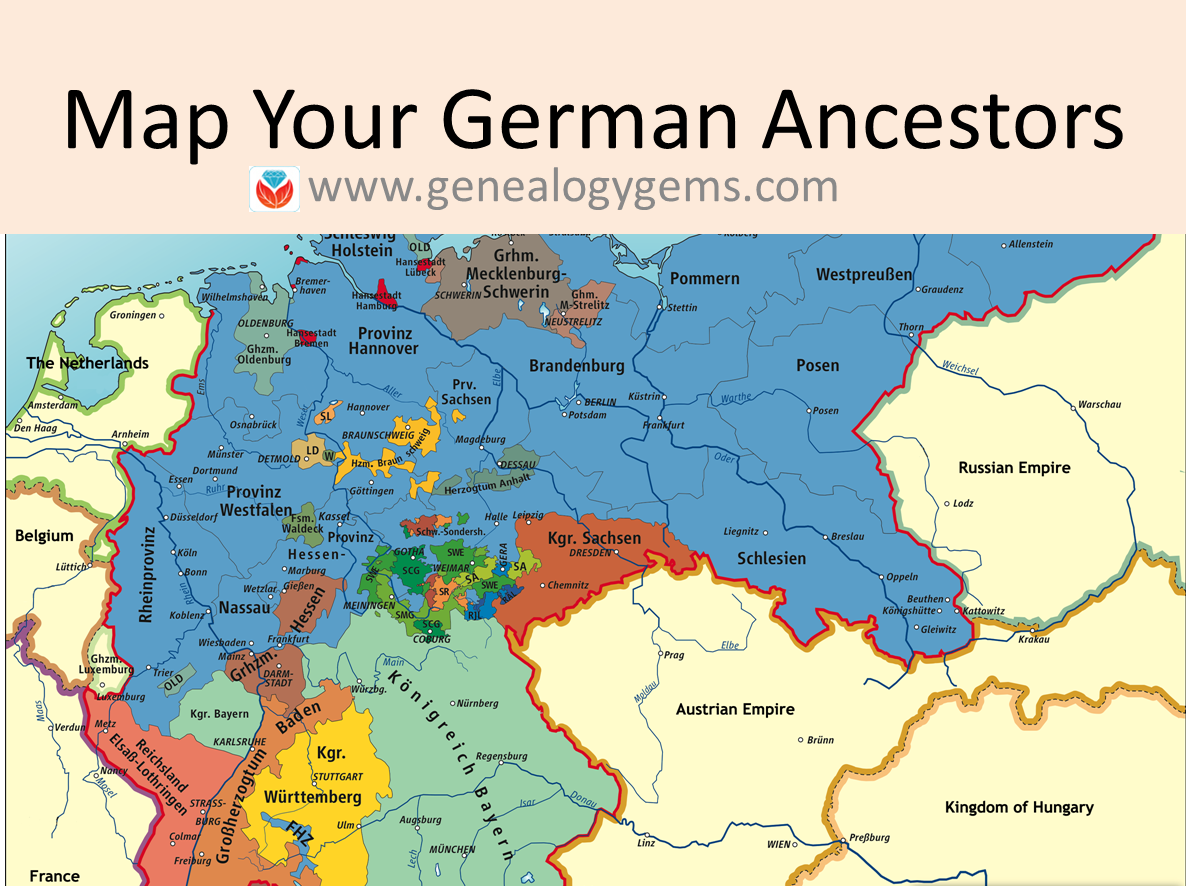
Map of German Reich 1871–1918. from kgberger, Creative Commons license, Wikipedia.com;
Anyone tracing German ancestors quickly finds themselves puzzling over maps in a region that has experienced a lot of change. Camille Andrus of Legacy Tree Genealogists recommends these 3 free German genealogy websites to help you navigate the former German empire–from Pomerania to Prussia to Poland. Here are her picks and her explanations for using them.
1. www.MeyersGaz.org
“For years, novice genealogists who found themselves embarking on the road of German genealogy were discouraged when needing to decipher an entry for their town in Meyers Orts- und Verkehrs-lexikon des deutschen Reichs (commonly known simply as Meyers or Meyer’s Gazetteer of the German Empire) due to the old German font in which the book was printed and the plethora of abbreviations that were used. To address this obstacle, the website www.MeyersGaz.org was created.
This online database not only explains the text and various abbreviations in the town entry that are found in the original printed version of Meyers, but also pinpoints the location of the town on both historic and modern maps, indicates the Catholic and Protestant parishes to which residents of the town would have belonged, and notes the distance from the town to all parishes within a 20-miles radius.
The database also allows users to search for a town using wildcards. This is especially useful when the exact spelling of a town is not known. For example, if the record on which you found the new town name indicated that the person came from Gross Gard…. where the second part of the word was smudged or illegible, you could simply put “Gross Gard*” into the database. In this case, the only two options would be Gross Garde in Pommern and Gross Gardienen in East Prussia. If you have a common town name such as Mülheim, you can filter the search results by province.”
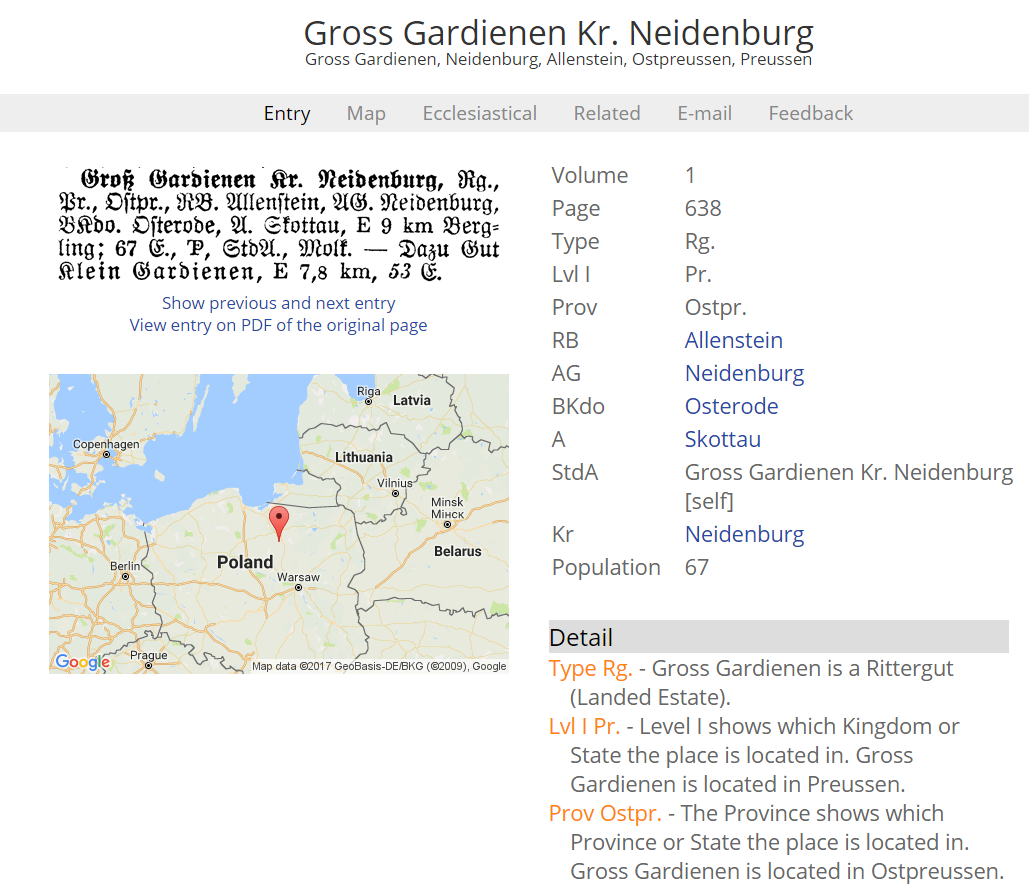
Screenshot from MeyersGaz.org.
 Note: Genealogy Gems Premium website members can hear more about MeyersGaz on Premium Podcast episode 143.
Note: Genealogy Gems Premium website members can hear more about MeyersGaz on Premium Podcast episode 143.
2. Kartenmeister
“Kartenmeister is a database for towns which are found east of the Oder and Neisse rivers in the former German Empire provinces of East Prussia, West Prussia, Brandenburg, Posen, Pomerania, and Silesia. This area is now part of modern Poland. The database allows users to search for towns using either their German or Polish name.
Again, using Gross Gardienen as our example town, we learn that the Polish name for the town is now Gardyny and is located in the Warminsko-Mazurskie province. Like MeyersGaz.org, collaboration between users is encouraged. Individuals can enter their email address into a mailing list according to the town they are interested in and specify surnames they are researching in that town.”
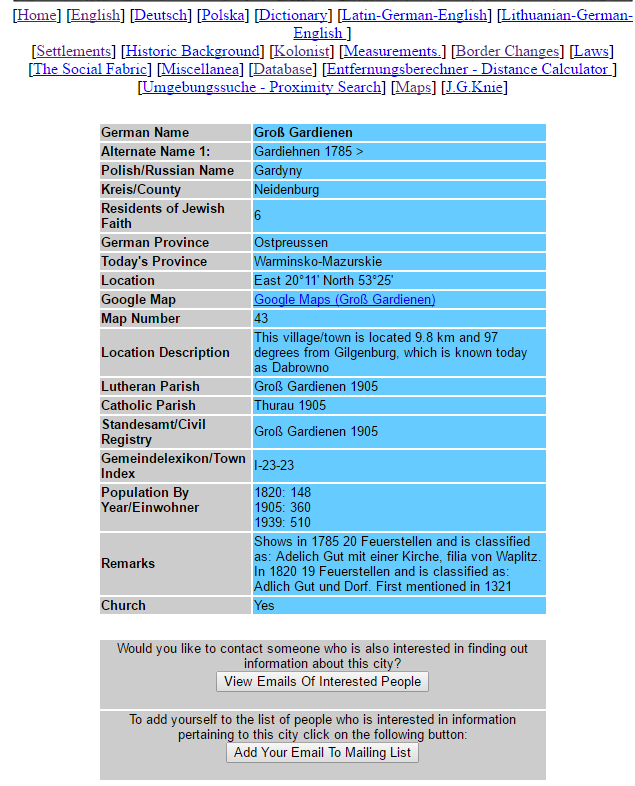
3. Lost Shoebox
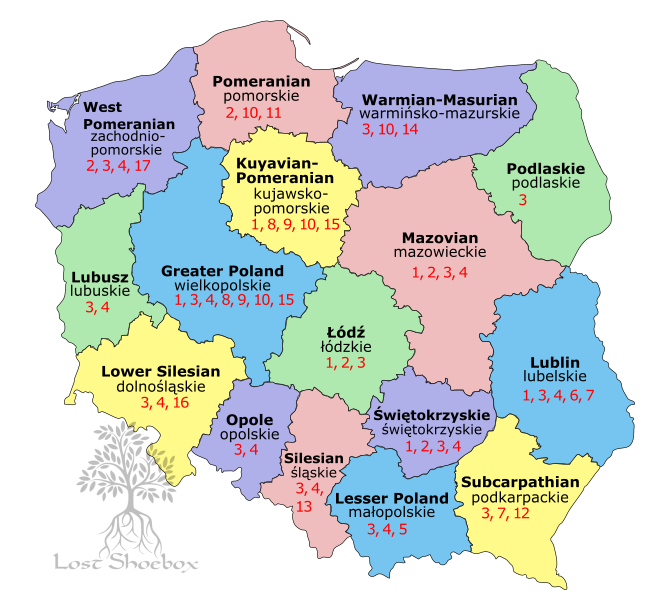
Map of Poland from Lost Shoebox shows where to find online records for each province.
“This website is an index to 17 websites focused on research in Poland. The list of websites corresponds with a map of Poland divided into its various modern provinces. Each number (representing a website) is listed on the map in each province for which it has records. Some websites are listed for nearly every province, while others show up for only one or two. The 17 websites featured on Lost Shoebox include either direct access to digital images, indexes to vital records, or lists of microfilms or other archival holdings.
If we were searching for records for Gross Gardienen or other nearby towns, we know from Kartenmeister that we would need to look in the Warminsko-Mazurskie province. The map shows the numbers 3, 10, and 14.” A corresponding key sends users to the appropriate websites.
“The third website on the list for the province brings us to the website for the Polish State Archive in Olsztyn. There are a plethora of digital images for both Evangelical church records and civil registration records available on this website.”
 Camille Andrus is a Project Manager for Legacy Tree Genealogists, a worldwide genealogy research firm with extensive expertise in breaking through genealogy brick walls. Her expertise includes Germany, Austria, German-speakers from Czech Republic and Switzerland and the Midwest region of the U.S., where many Germans settled.
Camille Andrus is a Project Manager for Legacy Tree Genealogists, a worldwide genealogy research firm with extensive expertise in breaking through genealogy brick walls. Her expertise includes Germany, Austria, German-speakers from Czech Republic and Switzerland and the Midwest region of the U.S., where many Germans settled.
Click here to learn more about Legacy Tree services and its research team

by Lisa Cooke | Aug 13, 2014 | 01 What's New, Beginner, Blogs, Family History Podcast
Family History: Genealogy Made Easy Podcast
with Lisa Louise Cooke
Republished August 13, 2014
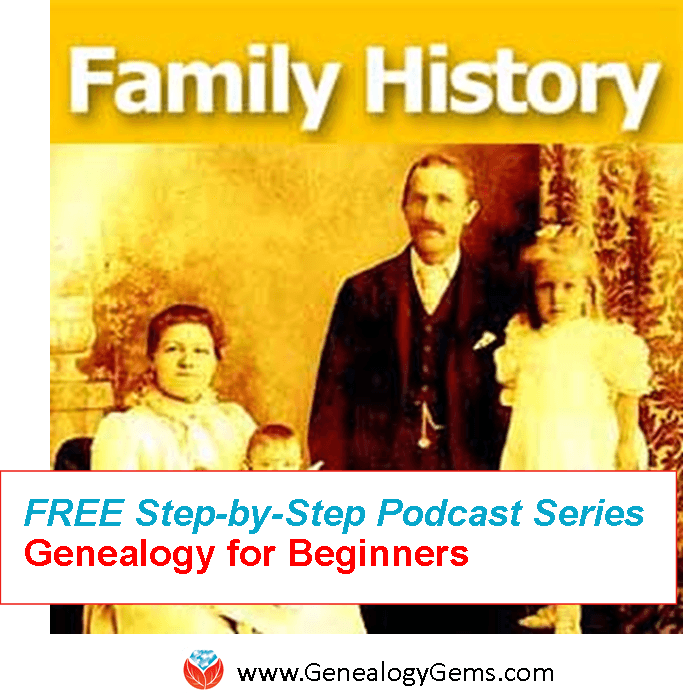
Listen to the Family History: Genealogy Made Easy podcast by Lisa Louise Cooke. It’s a great series for learning the research ropes and well as refreshing your skills.
https://lisalouisecooke.com/familyhistorypodcast/audio/fh41.mp3
Download the Show Notes for this Episode
Welcome to this step-by-step series for beginning genealogists—and more experienced ones who want to brush up or learn something new. I first ran this series in 2008-09. So many people have asked about it, I’m bringing it back in weekly segments.
Episode 41: How to Start a Genealogy Blog, Part 4: Get Inspired!
We’ve been talking quite a bit about family history blogging in the last few episodes. Today I have a few goodies for you this week that should help you make significant progress in creating your own blog if that’s something you’d like to do, and some goodies from other genealogy bloggers that will inspire and entertain you.
Blog post: Finding Charlie Stone, by Lee Drew
I really enjoy reading genealogy blogs that share insight into how the bloggers research has enriched their lives and I particularly enjoy reading the family stories they uncover along their journey.
In Episode 69 of the Genealogy Gems Podcast I featured a blogger reading one of their favorite blog posts (and my favorite for that matter) for the first time on the show. Lee Drew read his post My Mother Was A Quilter – the charming story of his early years growing up in a family of quilting women, and how his life hasn’t changed that much because he is surrounded by them today with his own wife, daughters and daughter-in-laws.
So sit back and enjoy another blog post called Finding Charlie Stone, by Lee Drew, who blogs at FamHist 2 and Lineage Keeper.
Did you start your own genealogy blog?
I have another talented genealogy blogger for you in this episode, but before we hear from her, I want to say that I hope you took a few minutes to follow the steps outlined in Episode 40 of this podcast and got your own blog started. Remember, you don’t have to make it public – so you can dabble all you want and only share if and when you’re ready.
To help you along I have produced two videos for you that walk you through those same steps, but in the videos I show you live on the computer screen how it’s done. So head to my Genealogy Gems TV Channel at YouTube to watch How to Blog Your Family History, Part 1 & How to Blog Your Family History, Part 2. Rest assured, there are more videos to come because we have only scratched the surface in creating your blog and actually blogging.
Blog Post: How Blogging Has Benefited My Research by Amy Coffin
Here’s a goodie from Amy Coffin who has a masters in Library science and is an avid genealogist who specializes in the use of Web 2.0 technologies to maximize research results. Her experience in the library world has led to a firm belief in the benefits of social networking and blogging to enhance the genealogy experience. Through her web site, www.AmyCoffin.com, Amy offers ideas on how others can maintain blogs and open up their own family history to whole new levels. When she’s not helping clients with their research, Amy shares her own personal genealogy adventures at her We Tree blog. In this blog post, Amy shares a story about how blogging has benefited her research.
We will be finishing up our family history blogging lesson next week with adding a few more gadgets and details, doing a bit of pre-planning for our blog posts, publishing our first article, and then talking about how your readers will subscribe to your blog.
Right now I’m putting the finishing touches on my class called Google for Genealogy. We’ve talked about various Google tools on both my podcasts and in this class we’re going to wade all the way and go in depth!








 Camille Andrus is a Project Manager for Legacy Tree Genealogists, a worldwide genealogy research firm with extensive expertise in breaking through genealogy brick walls. Her expertise includes Germany, Austria, German-speakers from Czech Republic and Switzerland and the Midwest region of the U.S., where many Germans settled.
Camille Andrus is a Project Manager for Legacy Tree Genealogists, a worldwide genealogy research firm with extensive expertise in breaking through genealogy brick walls. Her expertise includes Germany, Austria, German-speakers from Czech Republic and Switzerland and the Midwest region of the U.S., where many Germans settled.
